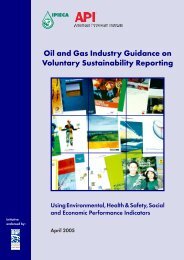Integrating Biodiversity Conservation into Oil and Gas ... - EBI
Integrating Biodiversity Conservation into Oil and Gas ... - EBI
Integrating Biodiversity Conservation into Oil and Gas ... - EBI
You also want an ePaper? Increase the reach of your titles
YUMPU automatically turns print PDFs into web optimized ePapers that Google loves.
1. ENERGY AND BIODIVERSITY<br />
Increasingly, many areas that are potentially valuable<br />
sources for oil <strong>and</strong> gas development are also being<br />
recognized <strong>and</strong> valued for their biodiversity. This<br />
section discusses the very real challenges that this<br />
juxtaposition represents to society, the energy industry<br />
<strong>and</strong> conservation organizations.<br />
1.1 BIODIVERSITY AND THE CHALLENGE<br />
TO SOCIETY<br />
Biological diversity, or biodiversity, is the variability<br />
among living organisms <strong>and</strong> the ecological complexes of<br />
which they are part, including diversity within species,<br />
between species <strong>and</strong> of ecosystems. <strong>Biodiversity</strong> provides<br />
a vast array of benefits to human society, including food<br />
<strong>and</strong> medicines, natural resources <strong>and</strong> ecological services<br />
such as pest control, water purification <strong>and</strong> climate<br />
regulation (see Box 2). Healthy ecosystems help maintain<br />
a sufficient <strong>and</strong> diverse gene pool for both wild <strong>and</strong><br />
domesticated species <strong>and</strong> allow species to more easily<br />
cope with climatic variations. In addition, biodiversity<br />
can provide people with spiritual, cultural <strong>and</strong> aesthetic<br />
benefits. Some forms of biodiversity loss, such as species<br />
extinction, are irreversible. Although many ecosystems<br />
BOX 2. BIODIVERSITY AND HUMAN WELFARE<br />
<strong>Biodiversity</strong> is fundamental to human welfare <strong>and</strong> economic development <strong>and</strong> plays a critical role in meeting human<br />
needs by maintaining the ecological processes upon which our survival depends. Broad-scale ecological systems provide<br />
services such as clean air <strong>and</strong> fresh water, benefits needed by everyone, whether in urban or rural settings.<br />
<strong>Biodiversity</strong> includes the full range of living organisms that people depend on, for both direct <strong>and</strong> indirect uses. Direct<br />
benefits from biodiversity come from the supply of goods or products – such as food, timber, clothing materials <strong>and</strong><br />
medicine – that can be consumed or traded in exchange for other required or desired assets. Although all people<br />
depend on biodiversity to some extent, the poorest, especially the rural poor, most directly depend on the products of<br />
healthy ecosystems, harvesting wild plants <strong>and</strong> animals for their food, fuel, clothing, medicine <strong>and</strong> shelter. Conserving<br />
biodiversity is therefore part of protecting the critical ecosystems that are essential for both environmental <strong>and</strong><br />
economic sustainability.<br />
<strong>Biodiversity</strong> also provides less tangible, indirect benefits that cannot be traded, but underpin the natural <strong>and</strong> production<br />
systems central to human survival. Watershed protection, carbon storage, pollination <strong>and</strong> nutrient recycling are all<br />
necessary environmental services. Genetic diversity <strong>and</strong> its associated information are used to create new crops or<br />
animal varieties <strong>and</strong> pharmaceuticals; modern agriculture, which depends on new genetic stock from natural ecological<br />
systems, is now a US$3 trillion global business. <strong>Biodiversity</strong> allows adaptation to take place through natural <strong>and</strong> artificial<br />
selection.<br />
There are many benefits of biodiversity that do not rely on use. <strong>Biodiversity</strong> is closely linked with human cultural<br />
<strong>and</strong> spiritual values, non-use benefits that are nonetheless powerful forces in many traditional cultures as well as in<br />
urbanized lives. For example, unique species <strong>and</strong> special l<strong>and</strong>scapes provide aesthetic benefits that are important sources<br />
of revenue through economic activities such as tourism. Tourism based on an intact natural environment is rapidly<br />
becoming one of the leading sources of foreign exchange earnings in countries with high biodiversity.<br />
Finally, other non-use benefits of biodiversity, such as the capacity to adapt to future changes, risks <strong>and</strong> uncertainties,<br />
cannot be captured by individuals, but are “owned” by society at local, regional <strong>and</strong> global levels.<br />
7<br />
<strong>Integrating</strong> <strong>Biodiversity</strong> <strong>Conservation</strong> <strong>into</strong> <strong>Oil</strong> <strong>and</strong> <strong>Gas</strong> Development


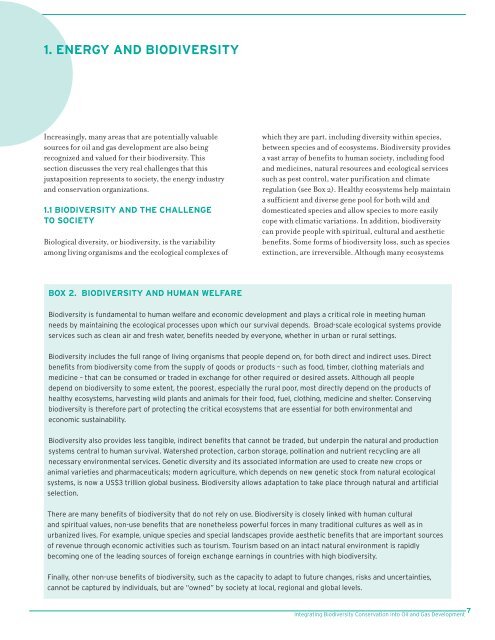
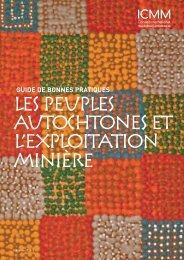
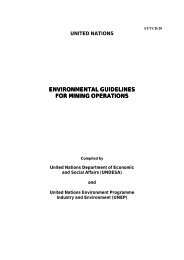
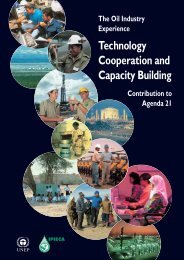
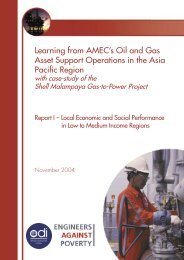
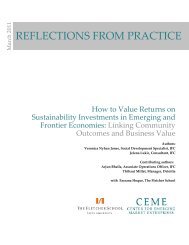
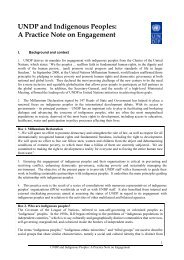
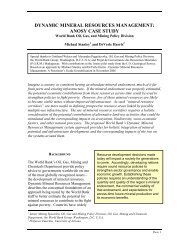
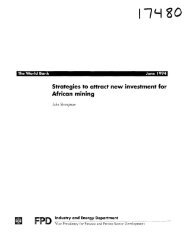

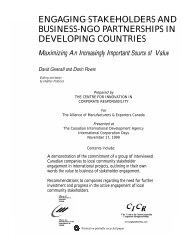
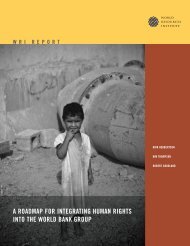
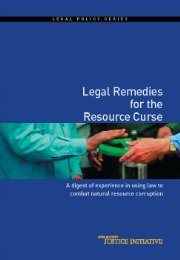
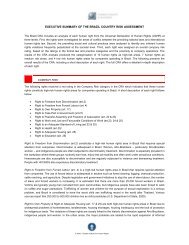
![[PDF] Community Development Toolkit - CommDev](https://img.yumpu.com/48616495/1/184x260/pdf-community-development-toolkit-commdev.jpg?quality=85)
